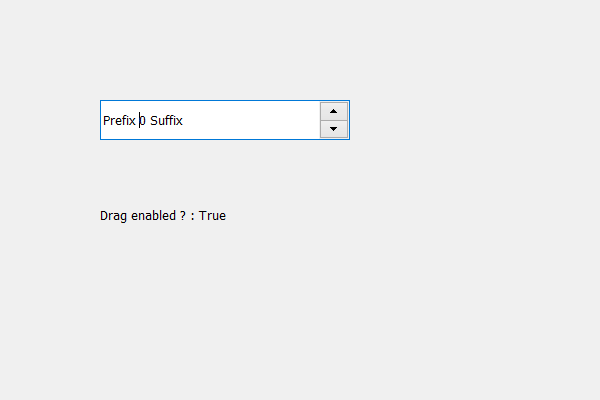En este artículo veremos cómo podemos verificar si el arrastre está habilitado o no para todo el texto, es decir, incluidos el prefijo y el sufijo. Cuando creamos un cuadro giratorio, no podemos arrastrar texto desde él, arrastrar texto significa mover el texto seleccionado a cualquier lugar de acuerdo con el cursor, usamos el setDragEnabledmétodo con el objeto de edición de línea del cuadro giratorio para habilitar el arrastre.
Para hacer esto, usamos el método dragEnabled con el objeto de edición de línea del cuadro de número.
Sintaxis: line_edit.dragEnabled()
Argumento: no requiere argumento
Retorno: Devuelve bool
A continuación se muestra la implementación.
# importing libraries
from PyQt5.QtWidgets import *
from PyQt5 import QtCore, QtGui
from PyQt5.QtGui import *
from PyQt5.QtCore import *
import sys
class Window(QMainWindow):
def __init__(self):
super().__init__()
# setting title
self.setWindowTitle("Python ")
# setting geometry
self.setGeometry(100, 100, 600, 400)
# calling method
self.UiComponents()
# showing all the widgets
self.show()
# method for widgets
def UiComponents(self):
# creating spin box
self.spin = QSpinBox(self)
# setting geometry to spin box
self.spin.setGeometry(100, 100, 250, 40)
# setting prefix to spin
self.spin.setPrefix("Prefix ")
# setting suffix to spin
self.spin.setSuffix(" Suffix")
# getting the line edit object
line = self.spin.lineEdit()
# enabling the drag
line.setDragEnabled(True)
# creating a label
label = QLabel(self)
# setting geometry to the label
label.setGeometry(100, 200, 200, 30)
# checking if drag is enabled
check = line.dragEnabled()
# setting text to the label
label.setText("Drag enabled ? : " + str(check))
# create pyqt5 app
App = QApplication(sys.argv)
# create the instance of our Window
window = Window()
# start the app
sys.exit(App.exec())
Producción :
Publicación traducida automáticamente
Artículo escrito por rakshitarora y traducido por Barcelona Geeks. The original can be accessed here. Licence: CCBY-SA